Hadza is a language isolate spoken by about 1,000 people around Lake Eyasi in northern Tanzania. In particular it is spoken in the Iramba and Mbulu districts of the Manyara region, and in the Maswa district of the Simiyu region. The majority of Hadza speakers are adults. Some children speak it, although they are more likely to speak Swahili.
Hadza is also known as Hadzabi, Hadzane, Hadzape, Hadzapi, Hatsa, Kangeju, Kindega, Kindiga, Kitindiga, Tindiga or Watindiga.
Hadza can be written with the Latin alphabet using an orthography devised in 2013 by Kirk Miller and Mariamu Anyawire. However, few Hadza speakers actually use it.

Download an alphabet chart for Hadza (Excel)
Details of the Hadza alphabet provided by Wolfram Siegel
Information about Hadza | Numbers
Information about the Hadza language
https://en.wikipedia.org/wiki/Hadza_language
https://www.ethnologue.com/language/hts
https://innovativeresearchmethods.org/hadza-copy/
https://rgris.com/hadzabe/
https://escholarship.org/uc/item/8k45g432#article_main
Adaizan, Ainu, Basque, Burushaski, Candoshi-Shapra, Chitimacha, Eskayan, Hadza, Haida, Karuk, Kawésqar, Keres, Kuot, Kusunda, Kutenai, Natchez, Nihali, Nivkh, Páez, Purepecha, Sandawe, Seri, Sumerian, Tartessian, Ticuna, Tiwi, Tonkawa, Tunica, Urarina, Waorani, Warao, Wardaman, Washo, Yaghan, Yele, Yuchi/Euchee, Zuni
Languages written with the Latin alphabet
Page created: 25.07.22. Last modified: 08.05.25
[top]
You can support this site by Buying Me A Coffee, and if you like what you see on this page, you can use the buttons below to share it with people you know.

If you like this site and find it useful, you can support it by making a donation via PayPal or Patreon, or by contributing in other ways. Omniglot is how I make my living.
Note: all links on this site to Amazon.com, Amazon.co.uk
and Amazon.fr
are affiliate links. This means I earn a commission if you click on any of them and buy something. So by clicking on these links you can help to support this site.
[top]